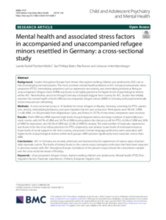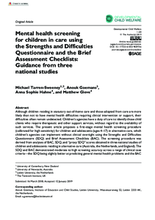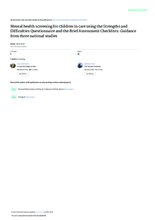Displaying 141 - 150 of 510
This study explored children orphaned by AIDS perceptions and experiences of HIV-related stigma and how it has affected their psychosocial well-being.
The aim of this study was to analyse subjectisuppleve well-being (SWB) among adolescents in care, considering the type of placement in greater depth and how it correlated with several explanatory variables.
The purpose of the study presented in this open access article was to provide an overview of the literature on associations between determinants and social climate and between social climate and outcomes in therapeutic residential youth care (TRC).
Despite limited research on the effectiveness of mind-body interventions with children and adolescents in out-of-home care in Canada, a review of available literature on mindfulness, arts-based methods, and yoga suggests these therapeutic interventions promote resilience and positive development.
This article presents a cross-sectional survey in 19 facilities for minor refugees in Bavaria, Germany, screening for posttraumatic stress symptoms (PTSS), depression, anxiety, externalizing behaviour, and post-migration factors.
The objective of this study was to test the associations between parent-child separation with telomere length (TL) and psychopathology during adolescence.
The present article proposes a first-stage mental health screening procedure (calibrated for high sensitivity) for children and adolescents (ages 4–17) in alternative care, which children’s agencies can implement without clinical oversight using the Strengths and Difficulties Questionnaire (SDQ) and Brief Assessment Checklists (BAC).
The present article proposes a first-stage mental health screening procedure (calibrated for high sensitivity) for children and adolescents (ages 4–17) in alternative care, which children’s agencies can implement without clinical oversight using the Strengths and Difficulties Questionnaire (SDQ) and Brief Assessment Checklists (BAC).
In this paper, the authors advance a framework for examining the nature and consequences of neglect, which they posit can be represented as variations along a continuum from severe psychosocial neglect to environmental enrichment.
This paper outlines a psychological skills group for unaccompanied asylum-seeking young people with a focus on cultural adaptations in the context of a UK mental health service.



